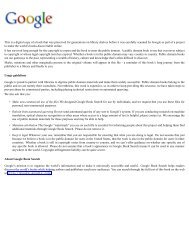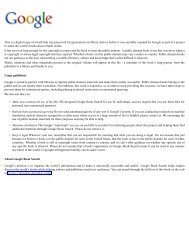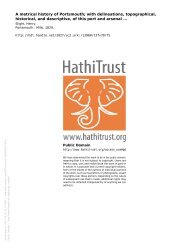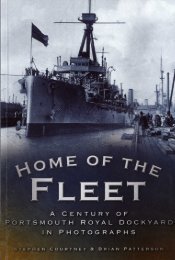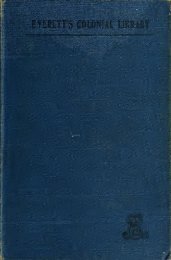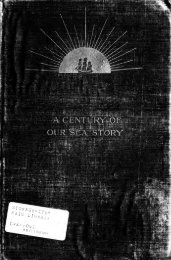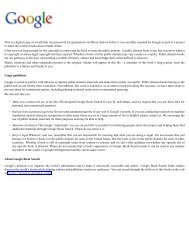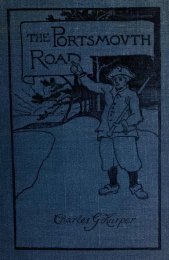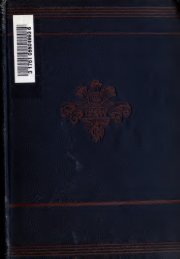- Page 2:
Digitized by the Internet Archive i
- Page 6:
Sherratt & Hughes Publishers to the
- Page 9 and 10:
THE NAVAL MUTINIES OF 1797 BY CONRA
- Page 11:
So Albion, round her rocky coast, W
- Page 14 and 15:
viii PREFACE Almost the whole polit
- Page 16 and 17:
x PREFACE Revolutions are commonly
- Page 18 and 19:
xii PREFACE choice of this subject
- Page 20 and 21:
— xiv CONTENTS CHAPTER VI. THE MU
- Page 22 and 23:
— xvi CONTENTS CHAPTER XV. MEASUR
- Page 24 and 25:
— — ; xviii CONTENTS Jephson's
- Page 26 and 27:
MAPS. Map of Portsmouth and Spithea
- Page 28 and 29:
— — — CONTRACTIONS USED IN TH
- Page 30 and 31:
4 THE NAVAL MUTINIES OF 1797 ebb. 1
- Page 32 and 33:
6 THE NAVAL MUTINIES OF 1797 most o
- Page 34 and 35:
8 THE NAVAL MUTINIES OF 1797 receiv
- Page 36 and 37:
" ; io THE NAVAL MUTINIES OF 1797 c
- Page 38 and 39:
; 12 THE NAVAL MUTINIES OF 1797 and
- Page 40 and 41:
— 14 THE NAVAL MUTINIES OF 1797 d
- Page 42 and 43:
i6 CHAPTER II. The Outbreak. The fl
- Page 44 and 45:
; i8 THE NAVAL MUTINIES OF 1797 who
- Page 46 and 47:
2o THE NAVAL MUTINIES OF 1797 Monda
- Page 48 and 49:
22 THE NAVAL MUTINIES OF 1797 when
- Page 50 and 51:
24 THE NAVAL MUTINIES OF 1T9T the s
- Page 52 and 53:
26 THE NAVAL MUTINIES OF 1797 Their
- Page 54 and 55:
— 28 THE NAVAL MUTINIES OF 1797 S
- Page 56 and 57:
30 THE NAVAL MUTINIES OF 1797 remar
- Page 58 and 59:
32 THE NAVAL MUTINIES OF 1797 morni
- Page 60 and 61:
34 THE NAVAL MUTINIES OF 1797 decid
- Page 62 and 63:
36 THE NAVAL MUTINIES OF 1797 that
- Page 64 and 65:
38 THE NAVAL MUTINIES OF 1797 Gardn
- Page 66 and 67:
40 THE NAVAL MUTINIES OF 1797 The c
- Page 68 and 69:
42 THE NAVAL MUTINIES OF 1797 The m
- Page 70 and 71:
44 THE NAVAL MUTINIES OF 1797 women
- Page 73 and 74:
CHAPTER IV. Delay and Suspicion. Ev
- Page 75 and 76:
THE DUKE OF BEDFORD'S SPEECH 49 dis
- Page 77 and 78:
ORDERS OF ist MAY 51 was in clanger
- Page 79 and 80:
: A RUMOUR OF SEDITION 53 until the
- Page 81 and 82:
FRESH PREPARATIONS 55 ment. But if
- Page 83 and 84:
UNREST ON THE ROYAL GEORGE 57 quest
- Page 85 and 86:
OUTBREAK AT ST. HELENS 59 and deleg
- Page 87 and 88:
LONDON READY FOR RESISTANCE 61 mine
- Page 89 and 90:
; OFFICERS IMPRISONED 63 popular wi
- Page 91 and 92:
JOHN FLEMING 65 of whom he had a ve
- Page 93 and 94:
6; CHAPTER VI. The Mutiny at St. He
- Page 95 and 96:
DISMISSAL OF OFFICERS 69 On Sunday
- Page 97 and 98:
SEAMEN ON SHORE 71 company, resign
- Page 99 and 100:
THE SEAMEN'S BILL PASSED 73 On that
- Page 101 and 102:
HOWE AT SPITHEAD 75 proclamation of
- Page 103 and 104:
; TERMS OF AGREEMENT 77 the officer
- Page 105 and 106:
—, APPOINTMENT OF OFFICERS 79 mis
- Page 107 and 108:
HOWE AND BRIDPORT 81 with an ample
- Page 109 and 110:
LATER DISORDERS 83 were of so littl
- Page 111 and 112:
A DISQUIETING RUMOUR 85 the author
- Page 113 and 114:
POLICY OF THE ADMIRALTY 87 newspape
- Page 115 and 116:
— THE GOVERNMENT 89 held by a man
- Page 117 and 118:
RESPONSIBILITY FOR DELAY 91 fresh o
- Page 119 and 120:
CHIEF MOVERS OF THE MUTINY 93 maint
- Page 121 and 122:
CONDITION OF THE FLEET 95 (viii) De
- Page 123 and 124:
. CONDITION OF THE FLEET 97 Terribl
- Page 125:
BOOK III. The Mutiny at the Nore Pa
- Page 128 and 129:
02 THE NAVAL MUTINIES OF 1797 men o
- Page 130 and 131:
io 4 THE NAVAL MUTINIES OF 1797 shi
- Page 132 and 133:
io6 THE NAVAL MUTINIES OF 1797 know
- Page 134 and 135:
108 THE NAVAL MUTINIES OF 1797 when
- Page 136 and 137:
no THE NAVAL MUTINIES OF 1797 The m
- Page 138 and 139:
ii2 THE NAVAL MUTINIES OF 1797 dock
- Page 140 and 141:
ii4 THE NAVAL MUTINIES OF 1797 Spit
- Page 142 and 143:
n6 THE NAVAL MUTINIES OF 1797 and v
- Page 144 and 145:
nS THE NAVAL MUTINIES OF 1797 of ea
- Page 146 and 147:
120 THE NAVAL MUTINIES OF 1797 that
- Page 148 and 149:
i22 THE NAVAL MUTINIES OF 1797 days
- Page 150 and 151:
I2 4 CHAPTER XL Richard Parker. It
- Page 152 and 153:
126 THE NAVAL MUTINIES OF 1797 the
- Page 154 and 155:
128 THE NAVAL MUTINIES OF 1797 when
- Page 156 and 157:
130 THE NAVAL MUTINIES OF 1797 on t
- Page 158 and 159:
132 THE NAVAL MUTINIES OF 1797 some
- Page 160 and 161: 134 CHAPTER XIII. The Period of Neg
- Page 162 and 163: i;,6 THE NAVAL MUTINIES OF 1797 mot
- Page 164 and 165: 138 THE NAVAL MUTINIES OF 1797 To t
- Page 166 and 167: 1 140 THH NAVAL MUTINIES OF 1797 Ad
- Page 168 and 169: — 142 THE NAVAL MUTINIES OF 1797
- Page 170 and 171: 144 THE NAVAL MUTINIES OF 1797 But
- Page 172 and 173: i 46 THE NAVAL MUTINIES OF 1797 It
- Page 174 and 175: ; 148 THE NAVAL MUTINIES OF 1797 to
- Page 176 and 177: 150 THE NAVAL MUTINIES OF 1797 capt
- Page 178 and 179: 152 THE NAVAL MUTINIES OF 1797 hims
- Page 180 and 181: 154 THE NAVAL MUTINIES OF 1797 "app
- Page 182 and 183: 156 THE NAVAL MUTINIES OF 1797 ties
- Page 184 and 185: 158 THE NAVAL MUTINIES OF 1797 a br
- Page 186 and 187: i6o THE NAVAL MUTINIES OF 1797 Even
- Page 188 and 189: 162 THE NAVAL MUTINIES OF 1797 sect
- Page 191 and 192: CHAPTER XIV. The North Sea Fleet. A
- Page 193 and 194: A DANGEROUS POLICY 167 which the fa
- Page 195 and 196: DELEGATES FROM THE NORE 169 are ver
- Page 197 and 198: COMMUNICATIONS WITH THE NORE 171 pu
- Page 199 and 200: : ; " ORIGIN OF THE MUTINY 173 The
- Page 201 and 202: DEFECTION OF THE FLEET 175 Montague
- Page 203 and 204: ; THE FLEET SAILS TO THE NORE 177 s
- Page 205 and 206: MOTIVES OF THE SEAMEN 179 conscious
- Page 207 and 208: BLOCKADE OF THE THAMES 181 governme
- Page 209: ; EFFECT OF THE BLOCKADE 183 the sa
- Page 213 and 214: VIOLENCE OF THE MUTINEERS 187 It wa
- Page 215 and 216: 2 THE MUTINY DEGENERATING 189 enter
- Page 217 and 218: THE ENERGY OF DESPAIR 191 of the mu
- Page 219 and 220: MEASURES OF DEFENCE 193 The instruc
- Page 221 and 222: REMOVAL OF BUOYS AND LIGHTS 195 two
- Page 223 and 224: SIR CHARLES GREY 197 any passage of
- Page 225 and 226: CAVALRY AND POLICE 199 patrolled ;
- Page 227 and 228: ; PUBLIC OPINION 201 mercantile cla
- Page 229 and 230: EFFECT ON THE GOVERNMENT 203 vessel
- Page 231 and 232: ; MEASURES IN PARLIAMENT 205 of pre
- Page 233 and 234: THE FLEET ISOLATED 207 mutinous sho
- Page 235 and 236: 209 CHAPTER XVI. The Decline of the
- Page 237 and 238: EFFECT OF ISOLATION 211 the governm
- Page 239 and 240: THE SEAMEN WAVERING 213 delegate, a
- Page 241 and 242: FRESH ATTEMPT TO NEGOTIATE 215 ment
- Page 243 and 244: LORD NORTHESK'S MISSION 217 given Y
- Page 245 and 246: THE LAST NEGOTIATION 219 ment as wo
- Page 247 and 248: SUPPLIES RUNNING LOW 221 already we
- Page 249 and 250: PLAN OF ESCAPE 223 to cover the rea
- Page 251 and 252: : ESCAPE SERIOUSLY INTENDED 225 be
- Page 253 and 254: THE SIGNAL FOR SAILING 227 When Hoc
- Page 255 and 256: PARKER'S TOUR OF THE FLEET 229 ably
- Page 257 and 258: HARANGUES OF THE DELEGATES 231 Bril
- Page 259 and 260: ESCAPE OF THE LEOPARD 233 delegates
- Page 261 and 262:
THE REPULSE FOLLOWS THE LEOPARD 235
- Page 263 and 264:
THE COLLAPSE BEGINNING 237 the flee
- Page 265 and 266:
— BLUE FLAGS 239 same day that a
- Page 267 and 268:
END OF THE MUTINY 241 that the last
- Page 269 and 270:
243 CHAPTER XVII. The Sequel of the
- Page 271 and 272:
— PARKER'S SURRENDER 245 for his
- Page 273 and 274:
: PREPARATIONS FOR COURTS-MARTIAL 2
- Page 275 and 276:
PARKER'S RESPONSIBILITY 249 his who
- Page 277 and 278:
PUNISHMENT OF RINGLEADERS 251 of ke
- Page 279 and 280:
RESULTS OF THE MUTINIES 253 from Sp
- Page 281 and 282:
THE LOYAL SHIPS 255 prisons. 1 Perh
- Page 283 and 284:
— CAUSES OF FAILURE 257 ment were
- Page 285:
BOOK V. The Grievances of the Seame
- Page 288 and 289:
; 262 THE NAVAL MUTINIES OF 1797 br
- Page 290 and 291:
264 THE NAVAL MUTINIES OF 1797 More
- Page 292 and 293:
266 THE NAVAL MUTINIES OF 1797 meat
- Page 294 and 295:
268 CHAPTER XIX. Discipline. A thir
- Page 296 and 297:
2 7 o THE NAVAL MUTINIES OF 1797 of
- Page 298 and 299:
; 272 THE NAVAL MUTINIES OF 179T it
- Page 300 and 301:
; 274 THE NAVAL MUTINIES OF 1797 th
- Page 302 and 303:
276 THE NAVAL MUTINIES OF 1T9T prob
- Page 304 and 305:
2 7 S THE NAVAL MUTINIES OF 179T de
- Page 306 and 307:
280 CHAPTER XX. Other Grievances. A
- Page 308 and 309:
282 THE NAVAL MUTINIES OF 1797 and
- Page 310 and 311:
2 284 THE NAVAL MUTINIES OF 1797 A
- Page 312 and 313:
286 THE NAVAL MUTINIES OF 1797 was
- Page 314 and 315:
288 THE NAVAL MUTINIES OF 1797 the
- Page 316 and 317:
2Q0 THE NAVAL MUTINIES OF 179T barg
- Page 318 and 319:
292 THE NAVAL MUTINIES OF 1797 or b
- Page 320 and 321:
294 THE NAVAL MUTINIES OF 179T fast
- Page 322 and 323:
296 THE NAVAL MUTINIES OF 1797 comp
- Page 325 and 326:
The characteristic mutinied in CHAP
- Page 327 and 328:
ADDRESS TO THE NATION 301 guineas t
- Page 329 and 330:
2 DESIRE FOR LIBERTY 303 In additio
- Page 331 and 332:
4 1 HOSTILITY TO THE GOVERNMENT 305
- Page 333 and 334:
— CONTEMPORARY OPINIONS 307 persi
- Page 335 and 336:
REPORT ON SEDITIOUS SOCIETIES 309 e
- Page 337 and 338:
INFLUENCE ON LOYAL SEAMEN 311 conte
- Page 339 and 340:
ORIGIN OF THE MUTINIES 3*3 conjectu
- Page 341 and 342:
315 CHAPTER XXIII. The Authors of t
- Page 343 and 344:
QUOTA-MEN 317 of the ringleaders at
- Page 345 and 346:
REVOLUTIONARIES IN THE FLEET 319 hi
- Page 347 and 348:
THOMAS JEPHSON 321 dered when the C
- Page 349 and 350:
CITIZEN DEAN 323 that he had questi
- Page 351 and 352:
CHARACTER OF THE SOCIETIES 325 I796
- Page 353 and 354:
" LACK OF DIRECT EVIDENCE 327 Secre
- Page 355 and 356:
UNITED IRISHMEN 329 definite, howev
- Page 357 and 358:
WOLFE TONE'S PROCLAMATION 331 indep
- Page 359 and 360:
POLICY OF UNITED IRISHMEN 333 issue
- Page 361 and 362:
VAGUE EXPECTATIONS 335 different fo
- Page 363 and 364:
WOLFE TONE'S DIARY 337 Marine, mean
- Page 365 and 366:
FINANCIAL SUPPORT 339 The resources
- Page 367 and 368:
AN INCIDENT IN PORTSMOUTH 341 betwe
- Page 369 and 370:
REPORTS FROM A SPY 343 June 10th, '
- Page 371 and 372:
DISSIPATED EFFORTS 345 were in port
- Page 373 and 374:
THE MAGISTRATES' REPORT 347 have se
- Page 375 and 376:
RUMOURS OF SUPPORT 349 encouraged t
- Page 377 and 378:
WHITBREAD AND THE MUTINEERS 351 Whi
- Page 379 and 380:
1 VIEWS OF THE MORNING CHRONICLE 35
- Page 381 and 382:
355 CHAPTER XXVI. Summary of the Ca
- Page 383 and 384:
POLITICAL AND ECONOMIC ASPECTS 357
- Page 385 and 386:
359 APPENDIX A. DOCUMENTS ILLUSTRAT
- Page 387 and 388:
PETITIONS 361 slops of every descri
- Page 389 and 390:
; PETITIONS 363 therefore beg leave
- Page 391 and 392:
SPENCER'S DIARY 365 their respectiv
- Page 393 and 394:
SPENCER'S DIARY 367 them that the p
- Page 395 and 396:
NEGOTIATIONS IN PORTSMOUTH 369 orde
- Page 397 and 398:
NEGOTIATIONS IN PORTSMOUTH 371 thei
- Page 399 and 400:
; NEGOTIATIONS IN PORTSMOUTH 373 he
- Page 401 and 402:
NEGOTIATIONS IN PORTSMOUTH 375 incr
- Page 403 and 404:
; JOHN FLEMING'S LETTER 377 His int
- Page 405 and 406:
THE BOARD IN SHEERNESS 379 that hou
- Page 407 and 408:
THE BOARD IN SHEERNESS 381 9 a.m. I
- Page 409 and 410:
REPORTS OF A POLITICAL CLUB 383 the
- Page 411 and 412:
REPORTS OF A POLITICAL CLUB 385 as
- Page 413 and 414:
— —; SONGS OF THE MUTINEERS 387
- Page 415 and 416:
SONGS OF THE MUTINEERS 389 Hark the
- Page 417 and 418:
— 39i APPENDIX B. NOTE ON PARKER'
- Page 419 and 420:
; 393 APPENDIX C. LIST OF AUTHORITI
- Page 421 and 422:
LIST OF AUTHORITIES 395 the Admiral
- Page 423:
LIST OF AUTHORITIES 397 Robinson, C
- Page 427 and 428:
; ; INDEX [Abbreviations : Letters
- Page 429 and 430:
; ; INDEX 4°3 Captains, influence
- Page 431 and 432:
;; INDEX 405 Sovereign, 76; opinion
- Page 433 and 434:
; ; Maria (victualling ship), 184,
- Page 435 and 436:
; ; INDEX 409 Petty Officers, attit
- Page 437 and 438:
; ; INDEX 4i surgeons, 322, 323. So
- Page 439:
SHEERNESS and THE NORE. ey,Suuthamp
- Page 442 and 443:
— — 2 MANCHESTER UNIVERSITY PUB
- Page 444 and 445:
— — — — MANCHESTER UNIVERSI
- Page 446 and 447:
— — — — 6 MANCHESTER UNIVER
- Page 448 and 449:
: — —— — MANCHESTER UNIVERS
- Page 450 and 451:
MAM HESTER UNIYERSITY PUBLICATIONS
- Page 452 and 453:
MANCHESTER UNIVERSITY PUBLICATIONS
- Page 454 and 455:
MANCHESTER UNIVERSITY PUBLICATIONS
- Page 456 and 457:
MANCHESTER UNIVERSITY PUBLICATIONS
- Page 458 and 459:
; io MANCHESTER UNIVERSITY PUBLICAT
- Page 460 and 461:
12 MANCHESTER UNIVERSITY PUBLICATIO
- Page 462 and 463:
1 4 MANCHESTER UNIVERSITY PUBLICATI
- Page 464 and 465:
16 MANCHESTEB UNIVERSITY PUBLICATIO
- Page 466 and 467:
MANCHESTER UNIVERSITY PUBLICATIONS
- Page 468:
— W 20 MANCHESTEB UNIVERSITY PUII




